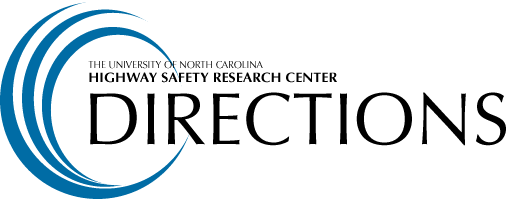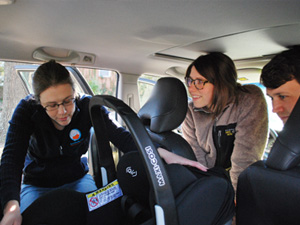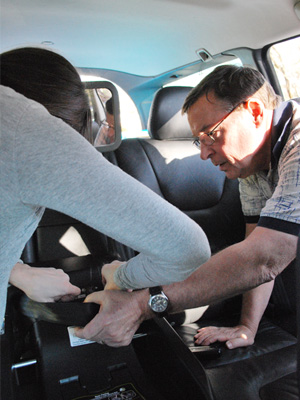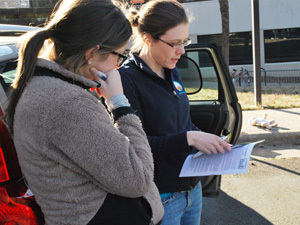

BuckleUpNC.org puts focus on safety for the whole family

After many years of following the "buckle up for safety" message, most adults are comfortable with the simple act of wearing a seat belt. But ask any new parent – the first ride home from the hospital with a new baby is nerve-racking. Knowing that baby is safe and secure in a properly-installed car seat can make the trip less stressful.
Parents can make sure their child's car seat is installed correctly by following the manufacturer's instructions, but if they need a little help, child passenger safety experts provide free one-on-one "hands-on" assistance at permanent checking stations across North Carolina. Permanent Checking Stations (PCS) are locations where parents and other caregivers can receive information about child and adult safety from nationally certified Child Passenger Safety Technicians and have their car seats and seat belts checked to be sure they are installed and used correctly. The Technicians will try to address any concerns or questions parents or other caregivers may have.
"Child Passenger Safety Technicians go through four days of training to earn their certification and must keep up-to-date on the latest child passenger safety information and recommendations through conferences, seminars and other continuing education programs," said Bill Hall, HSRC occupant protection program manager. "These Technicians provide a valuable resource to our communities and have made a significant difference in keeping child passengers and their families as safe as possible."
Staff at the Highway Safety Research Center (HSRC), the administrators of the buckleupnc.org website – the clearinghouse for North Carolina-specific information about car seats, seat belts and airbags – not only conduct these car seat inspections, they also work with partner agencies to coordinate trainings for and support the approximately 2,500 Certified Child Passenger Safety Technicians who provide PCS services at one of the 180 PCS locations across North Carolina. In addition, HSRC maintains a list of recalled car seats that Technicians can use during car seat checks.
Parents and other caregivers can find a checking station or other programs in their area by searching www.buckleupnc.org/local-programs-checking-stations/.
What happens during a car seat check?

- Before the Car Seat Check: Before you go to a car seat check you should read through your car seat owner's manual and try to install the seat on your own. This way you will be able to talk with the Technician about anything that was difficult or hard to understand. It is always helpful to bring both your car seat and vehicle owner's manuals to the car seat check. Except for the case of expectant parents, children who will be using the car seats should be present for the seat check.
- Car Seat Inspection: When you arrive at the Permanent Checking Station the Technician will ask you for some general information about your child and your car seat. The Technician will inspect the car seat for damage, make sure the seat is neither expired nor recalled, and make sure the seat is appropriate for the age and size of your child. You may notice that the Technician uses a standard form to make sure all aspects of the seat check are covered.
- Installation Check: The Technician will check to see if the car seat was installed correctly. If the car seat was not installed correctly the Technician will demonstrate proper installation and walk you through the installation process. The Technician will supervise you as you install the seat on your own to make sure you are able to do it correctly.
- Harnessing Check and "Next-Steps" Education: The Technician will point out specific features on your car seat and will demonstrate how to adjust the harness straps on the child. He or she will also point out weight limits, expiration dates and other relevant information, as well as discuss best practice recommendations for your child's protection and what the next steps will be for your child. He or she will do this for all car seats in the vehicle and also check for proper seat belt fit on older children in the family.

Child passenger safety doesn't end with a seat check. It is a parent's responsibility to make sure to follow the manufacturer's recommended weight and height limits and switch to the next step when a child reaches the upper weight or height limit allowed by the child seat's manufacturer. It is also important to pay attention to recall notices.
"Recalls can be issued for a variety of reasons, from reasons related to the crashworthiness of the car seat to flammability of the upholstery or padding, or because of parts that may come loose and pose a choking hazard," said Hall. "If, at any time, a parent has questions about their child's car seat, we encourage parents to first contact the car seat's manufacturer and then, if help is still needed, to contact a Technician at a checking station."
For more information about child safety seat checks, or for other child passenger safety resources, visit the newly redesigned buckleupnc.org website.
The University of North Carolina Highway Safety Research Center
730 Martin Luther King Jr. Blvd, Suite 300 | Campus Box 3430 | Chapel Hill, NC 27599-3430
Phone: 919.962.2203 | Fax: 919.962.8710
http://www.hsrc.unc.edu